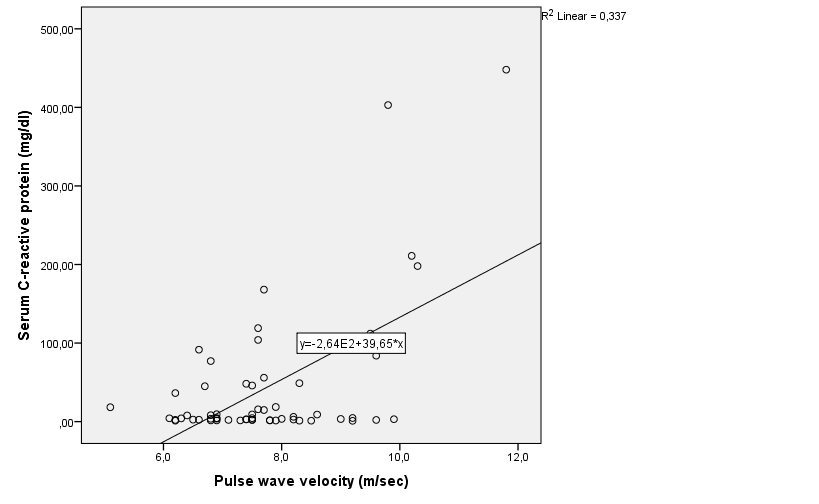Session Information
Session Type: ACR Poster Session A
Session Time: 9:00AM-11:00AM
Background/Purpose: Arterial
stiffness represents the viscoelastic properties of the vessel wall. It occurs
as a result of known atherosclerotic risk factors such as hypertension,
diabetes mellitus, smoking, hypercholesterolemia and aging. It has high cardiovascular
risk-predictive value, reproducibility and cost-effectiveness. Familial
Mediterranean Fever (FMF) is an autoinflammatory disease characterized by
recurrent attacks of fever and serositis. These patients may experience a high
risk of cardiovascular events due to the ongoing and recurring inflammatory
state. In this study, we aimed to investigate the arterial stiffness and
associated factors in patients with FMF.
Methods: A total of 104 subjects
were enrolled in the study. 35 of them were healthy controls. 69 patients, of
whom 11(16%) were female, were consecutive patients with a diagnosis of FMF
examined in a tertiary rheumatology outpatient clinic. The mean ages and BMI’s
of the patient vs control groups were 27.04±8.0 vs 28.29±4.9 years (p=0.331)
and 24.11±3.3 vs 24.48±3.2 kg/m2 (p=0.586). The groups were also matched in
terms of gender (p=0.836) and smoking status of the subjects (p=0.058). The
demographical, clinical, laboratory and genetic features of the patients were
recorded. The predominant attack type was recorded as peritonitis, pleuritis,
arthritis, febrile myalgia and erysipelas-like erythema. Tensiomed device
(TensoMed Ltd, Budapest, Hungary) was used for arterial stiffness measurements.
SPSS 22.0 statistical package was used for statistical analysis.
Results: FMF patients had a
significantly higher pulse wave velocity measurements (PWV) (7.73±1.3 vs
7.18±1.1 m/sec; p=0.03), lower brachial and aortic augmentation indexes (-64.6±14.6
vs -54.6±25.9 %, p=0.041 and 4.9±7.4 vs 14.0±11.5 %, p=0.025; respectively) compared
to controls. Central aortic pressure and ankle brachial index measurements were
statistically similar. 31(45%) of the patients were examined in attack and had
significantly higher PWV measurements (8.17±1.6 vs 7.38±0.9 m/sec; p=0.027)
compared to symptomless patients. PWV measurements had significant correlations
to serum CRP (Figure), WBC, erythrocyte sedimentation rate, fibrinogen, and
neutrophil/lymphocyte ratios (r=0.581, 0.251, 0.367, 0.348, 0.337; p<0.001,
p=0.049, 0.004, 0.006, 0.007; respectively. The genetic mutation and
predominant attack type had no effect on arterial stiffness measurements.
Conclusion: These preliminary
results suggest that FMF patients have impaired arterial stiffness measurements,
which get worse during attacks, compared to controls. The impaired arterial
stiffness measurements seem to be due to the severity of the inflammatory
state, rather than attack type and genetic mutations. These data point to
higher future cardiovascular risks in FMF patients.
Figure: The association between serum CRP (mg/dl) and PWV
(m/sec) in FMF patients.
To cite this abstract in AMA style:
Cakar M, Akhan M, Doğan T, Taskin G, Ozturk K, Cinar M, Arslan E, Yılmaz S. Investigation of the Arterial Stiffness and Associated Factors in Patients with Familial Mediterranean Fever [abstract]. Arthritis Rheumatol. 2015; 67 (suppl 10). https://acrabstracts.org/abstract/investigation-of-the-arterial-stiffness-and-associated-factors-in-patients-with-familial-mediterranean-fever/. Accessed .« Back to 2015 ACR/ARHP Annual Meeting
ACR Meeting Abstracts - https://acrabstracts.org/abstract/investigation-of-the-arterial-stiffness-and-associated-factors-in-patients-with-familial-mediterranean-fever/

